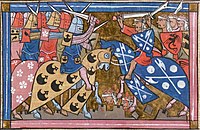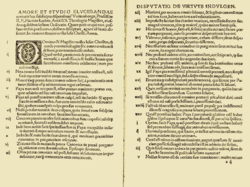-
Use Cases
-
Resources
-
Pricing
Doctrinal Developments
Council of Nicaea
325
% complete
The Council of Nicaea, convened by Emperor Constantine, addressed the Arian controversy and formulated the Nicene Creed, establishing key doctrinal beliefs about the nature of Christ and the Holy Trinity.
Image source: First Council of Nicaea

Council of Trent
1545 - 1563
% complete
The Council of Trent, a response to the Protestant Reformation, addressed doctrinal and disciplinary issues within the Roman Catholic Church, reaffirming Catholic teachings and initiating reforms.
Image source: Council of Trent

First Vatican Council
1869 - 1870
% complete
The First Vatican Council, convened by Pope Pius IX, defined the doctrine of papal infallibility, asserting the Pope's authority in matters of faith and morals when speaking ex cathedra.
Image source: First Vatican Council

Second Vatican Council
1962 - 1965
% complete
The Second Vatican Council, under Pope John XXIII and Pope Paul VI, introduced significant reforms and modernizations within the Roman Catholic Church, addressing liturgy, ecumenism, interfaith dialogue, and the role of the laity.
Image source: Second Vatican Council

Ordination of Women
1974 - Present
% complete
The ongoing debate and gradual acceptance of the ordination of women as priests and ministers in various Christian denominations have challenged traditional gender roles and practices within the Church.
Image source: Ordination of women

Schisms and Divisions
Great Schism
1054
% complete
The Great Schism marked the formal split between the Eastern Orthodox Church and the Roman Catholic Church, primarily due to theological, cultural, and political differences.
Image source: East–West Schism

Crusades
1096 - 1291
% complete
The Crusades were a series of military campaigns initiated by Western European Christians to recapture the Holy Land from Muslim control. These conflicts had profound religious, political, and social implications, leaving a lasting impact on both Christianity and the Muslim world.
Image source: Crusades

Reformation and Modern Church
Protestant Reformation
1517 - 1648
% complete
The Protestant Reformation, ignited by Martin Luther's Ninety-Five Theses, challenged the authority and practices of the Roman Catholic Church, leading to the establishment of various Protestant denominations and significant changes in religious, political, and social landscapes.
Image source: Reformation

Thirty Years' War
1618 - 1648
% complete
The Thirty Years' War, fought primarily in Central Europe, involved religious, political, and territorial conflicts between Protestant and Catholic states, resulting in significant casualties and reshaping the balance of power in Europe.
Image source: Thirty Years' War

World Missionary Conference
1910
% complete
The World Missionary Conference in Edinburgh brought together representatives from various Christian denominations to discuss and promote global missions, fostering cooperation and shaping the modern missionary movement.
Image source: 1910 World Missionary Conference

Emergence of the Megachurches
1970 - Present
% complete
The emergence of megachurches, characterized by large congregations and contemporary worship styles, has influenced the landscape of modern Christianity, emphasizing community engagement, multimedia outreach, and charismatic leadership.
Image source: Megachurch

Fall of the Berlin Wall
Nov 9, 1989
% complete
The fall of the Berlin Wall, a symbol of the Cold War division between East and West, marked a significant turning point in European history and had profound implications for the reunification of Germany and the spread of Christianity in Eastern Europe.
Image source: Fall of the Berlin Wall

Pope Francis' Papacy
2013 - Present
% complete
Pope Francis, the first Jesuit Pope and the first Pope from the Americas, has brought a renewed focus on social justice, interfaith dialogue, and environmental stewardship, shaping the modern Catholic Church.
Image source: Pope Francis

COVID-19 Pandemic and the Church
2019 - Present
% complete
The global COVID-19 pandemic has profoundly impacted religious practices and gatherings, leading to the closure of churches, the adoption of online worship, and the reevaluation of communal rituals and traditions within various Christian denominations.
Image source: Impact of the COVID-19 pandemic on religion

Early Church
Conversion of Saint Paul
33 - 36
% complete
Saul of Tarsus, a persecutor of Christians, encountered a vision of Jesus Christ on the road to Damascus. This transformative experience led to his conversion to Christianity and his subsequent missionary journeys, making him one of the most influential figures in the early spread of Christianity.
Image source: Conversion of Paul the Apostle

Martyrdom of Saint Stephen
34
% complete
Saint Stephen, one of the first Christian deacons, was stoned to death in Jerusalem for proclaiming his faith in Jesus Christ, becoming the first Christian martyr.
Image source: Martyr

Key Facts
- The Christian Church was founded in the 1st century after the death and resurrection of Jesus Christ.
- In 313 AD, Emperor Constantine issued the Edict of Milan, granting freedom of worship to Christians.
- The East-West Schism occurred in 1054, resulting in the split between the Eastern Orthodox Church and the Roman Catholic Church.
- The Protestant Reformation took place in the 16th century, led by reformers such as Martin Luther and John Calvin.
- The Second Vatican Council was held from 1962 to 1965, bringing significant changes to the practices and teachings of the Roman Catholic Church.
Source
This Church History timeline was generated with the help of AI using information found on the internet.
We strive to make these timelines as accurate as possible, but occasionally inaccurates slip in. If you notice anything amiss, let us know at [email protected] and we'll correct it for future visitors.
Create a timeline like this one for free
Preceden lets you create stunning timelines using AI or manually.
Customize your timeline with one of our low-cost paid plans
Export your timeline, add your own events, edit or remove AI-generated events, and much more
Free
$
0
free forever
No credit card required.
Basic
$
10
/month
billed annually
Cancel anytime.
Pro
$
16
/month
billed annually
Cancel anytime.
Common Questions
Can I cancel anytime?
Yes. You can cancel your subscription from your account page at anytime which will ensure you are not charged again. If you cancel you can still access your subscription for the full time period you paid for.
Will you send an annual renewal reminder?
Yes, we will email you a reminder prior to the annual renewal and will also email you a receipt.
Do you offer refunds?
Yes. You can email us within 15 days of any payment and we will issue you a full refund.
What if I have more questions?
Check out our pricing docs or send us an email anytime: [email protected].